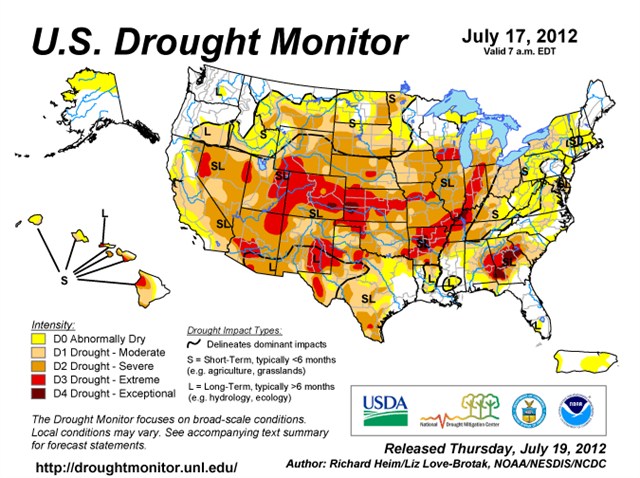The Missing Link: Droughts, the Economy and Climate Change
 The effects of the vast drought afflicting America’s farm belt are rippling across the economy. Major companies apparently feeling the heat from rising crop prices include McDonald’s, Smithfield Foods and Arthur Daniels Midland, which processes agricultural commodities.
The effects of the vast drought afflicting America’s farm belt are rippling across the economy. Major companies apparently feeling the heat from rising crop prices include McDonald’s, Smithfield Foods and Arthur Daniels Midland, which processes agricultural commodities.More than half of the nation’s pasture and rangeland is now plagued by drought - the largest natural disaster area in U.S. history. And with corn prices soaring as crops wither, other sectors are nervously watching the weather forecasts and assessing potential impacts on their business. For example:
•As corn prices rise, first dairy and then meat prices are expected to follow (cattle are fed on corn), which will hit major beef buyers such as McDonald’s.
•Corn is also a ubiquitous ingredient in foods ranging from corn flakes to ketchup, bread, and soda. With as many as three-quarters of all supermarket products containing corn, there are significant implications for the food and soft drink industry - and consumers - should the drought fail to let up.
•The price of ethanol - again made from corn - is also rising amid fears of possible future shortages. This in turn may hike the price of gasoline, a significant cost for many businesses as well as consumers.
The Climate Connection
But perhaps the most sobering implication of this agricultural crisis is what it heralds for the long-term health of our economy.
Unlike the reaction to the recent searing heat wave, the mainstream media has largely ignored a possible climate connection to America’s worst drought since 1956. While this particular drought could turn out to be due to several factors, (such as a second winter of La Niña), we know the afflicted region will look increasingly as it does today in a warmer world.
The U.S. Global Change Research Program, for example, has projected more frequent and severe droughts across much of the United States. Their forecast for the Great Plains region, 70 percent of which is farmland, is dire: increasing temperatures and evaporation rates and more sustained drought, furthering stressing already overstrained water resources.
As if this weren’t warning enough, NOAA recently demonstrated that this is not a distant prospect. In a new report, it linked some recent extreme events, including the record-breaking 2011 drought in Texas, directly to human-induced climate change.

Why Business Should Act
Such reports should be essential reading not just for policymakers but also for CEOs. As I pointed out in a recent Forbes blog, a changing climate impacts the private sector in many more ways than the rising price of commodities.
Extreme weather events can have material impacts on a company’s operations, from depleting water sources to disrupting the supply of raw materials, or destroying vital infrastructure, such as refineries and transport networks. Such events, as well as other climatic changes also affect global supply chains.
We need only look back to last year to see how the cumulative economic costs can mount.
Droughts, floods, hurricanes and other extreme weather cost the U.S. economy at least $55 billion in 2011, according to NOAA, with 14 separate events exceeding $1 billion. The devastating drought and associated wildfires in Texas and Oklahoma alone cost American crop farmers $7.6 billion and the cotton and cattle industries around $5.4 billion.
Companies are not unaware of these looming dangers and how a changing climate could compromise their operations. A 2011 survey of 72 major corporations, for the UN Global Compact (with technical support from WRI) found that 83 percent believed climate change impacts posed a risk to their products or services.
But far fewer are acting on their concerns. Given the risks they face, more businesses, and especially global multinationals, need to develop comprehensive climate strategies to reduce their emissions and increase their resilience. At the same time, as voices from all sides - including business and government leaders - have made increasingly clear, the private sector needs to play a more proactive role in helping tackle this escalating global challenge.
Weathering the intensifying climate challenge by pursuing business as usual is simply not an option. Instead, our changing climate demands innovative ideas and unprecedented cooperation between governments, the private sector and civil society.
The implications of the latest climate science for both business and society are clear and deeply disturbing. If we fail to act, today’s rare and costly drought may become a routine event tomorrow.
You can return to the main Market News page, or press the Back button on your browser.

